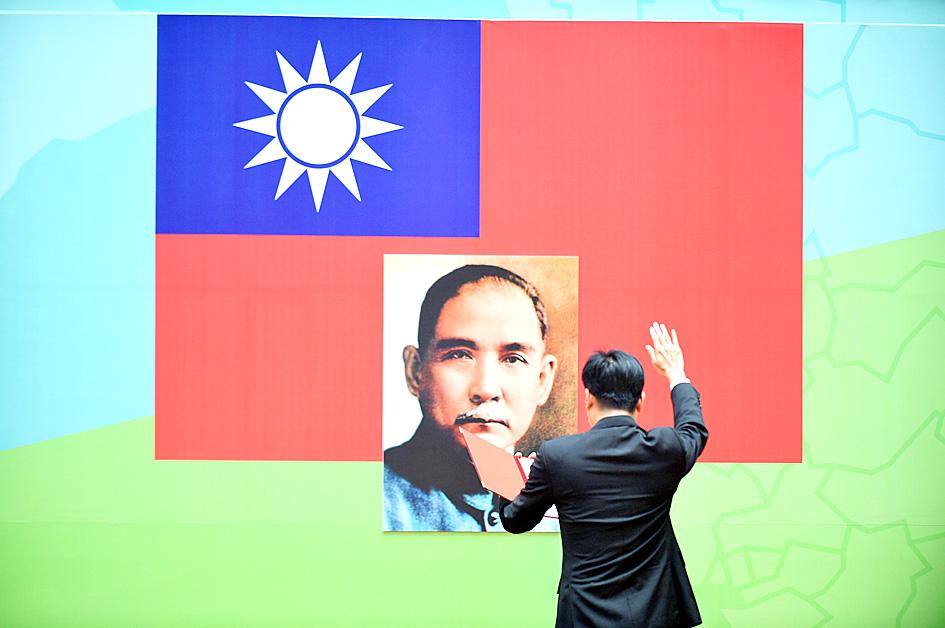A proposal to eliminate a requirement that public officials and military personnel take their oaths of office in front of a portrait of Sun Yat-sen (孫逸仙) was aimed at “doing away with authoritarianism,” Democratic Progressive Party (DPP) Legislator Fan Yun (范雲) said yesterday.
Article 6 of the National Emblem and National Flag of the Republic of China Act (中華民國國徽國旗法) stipulates that government agencies, schools and the military should display the national flag above an image of Sun at the front and center of any room where people congregate.
Fan and DPP Legislator Chuang Jui-hsiung (莊瑞雄) have proposed amending the act to eliminate the requirement that elected officials and others face a portrait of Sun while being sworn in.

Photo: Chang Chung-yi, Taipei Times
Chinese Nationalist Party (KMT) Legislator Charles Chen (陳以信) yesterday blasted the proposal on Facebook.
“The DPP thinks that just doing away with Chinese history is not enough, now they want to eliminate all of the Republic of China’s [ROC] founding fathers,” he wrote.
The DPP wants to remove portraits of Sun under the auspices of “transitional justice,” but tomorrow it could use the same excuse to remove the national flag, he said.
“Once the national flag is moved away from our founder, it will lose its revolutionary significance, and the nation will lose the significance of its founding. If the DPP later decides to replace the national flag, the people will already be numb to the idea,” he said.
Next, the nation’s name will be in danger, Chen added.
Fan said Chen is too paranoid.
It is democratic to propose that people should no longer have to swear an oath to the portrait of a national founder, Fan said, noting that many nations do not have such a requirement, including the US, France, Germany, Italy, the Czech Republic and South Korea.
European prime ministers take their oaths facing their legislatures, while the US president faces the chief justice of the US Supreme Court, who is administering the oath of office, she said, adding that only in Taiwan must officials face an authoritarian figure.
Taiwan must move further toward democracy and away from authoritarianism, and should do so by eliminating the idolization of an authoritarian figure, and removing such portraits is part of the process of democratization, she added.
Chuang said that requiring the installment of a political leader’s portrait is unnecessary in a democracy, and there is no need to “worship a totem.”
The amendment is aimed at liberating people from the authoritarian-era mindset, normalizing the nation, advancing democracy and allowing the public to avoid having to worship long-gone idols, he said.
Chen’s comments “take things way too far,” Chuang said.
“Taiwan is now a democracy. The KMT should drop its authoritarian mindset and feudalist thinking — using the law to mandate the hanging portraits of a founding father and swearing an oath to them is too backward,” he added.

US climber Alex Honnold is to attempt to scale Taipei 101 without a rope and harness in a live Netflix special on Jan. 24, the streaming platform announced on Wednesday. Accounting for the time difference, the two-hour broadcast of Honnold’s climb, called Skyscraper Live, is to air on Jan. 23 in the US, Netflix said in a statement. Honnold, 40, was the first person ever to free solo climb the 900m El Capitan rock formation in Yosemite National Park — a feat that was recorded and later made into the 2018 documentary film Free Solo. Netflix previewed Skyscraper Live in October, after videos

NUMBERS IMBALANCE: More than 4 million Taiwanese have visited China this year, while only about half a million Chinese have visited here Beijing has yet to respond to Taiwan’s requests for negotiation over matters related to the recovery of cross-strait tourism, the Tourism Administration said yesterday. Taiwan’s tourism authority issued the statement after Chinese-language daily the China Times reported yesterday that the government’s policy of banning group tours to China does not stop Taiwanese from visiting the country. As of October, more than 4.2 million had traveled to China this year, exceeding last year. Beijing estimated the number of Taiwanese tourists in China could reach 4.5 million this year. By contrast, only 500,000 Chinese tourists are expected in Taiwan, the report said. The report

Temperatures are forecast to drop steadily as a continental cold air mass moves across Taiwan, with some areas also likely to see heavy rainfall, the Central Weather Administration (CWA) said. From today through early tomorrow, a cold air mass would keep temperatures low across central and northern Taiwan, and the eastern half of Taiwan proper, with isolated brief showers forecast along Keelung’s north coast, Taipei and New Taipei City’s mountainous areas and eastern Taiwan, it said. Lows of 11°C to 15°C are forecast in central and northern Taiwan, Yilan County, and the outlying Kinmen and Lienchiang (Matsu) counties, and 14°C to 17°C

STEERING FAILURE: The first boat of its class is experiencing teething issues as it readies for acceptance by the navy, according to a recent story about rudder failure The Hai Kun (海鯤), the nation’s first locally built submarine, allegedly suffered a total failure of stern hydraulic systems during the second round of sea acceptance trials on June 26, and sailors were forced to manually operate the X-rudder to turn the submarine and return to port, news Web site Mirror Daily reported yesterday. The report said that tugboats following the Hai Kun assisted the submarine in avoiding collisions with other ships due to the X-rudder malfunctioning. At the time of the report, the submarine had completed its trials and was scheduled to begin diving and surfacing tests in shallow areas. The X-rudder,